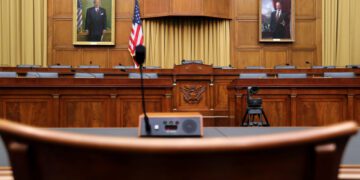By John F. Di Leo -
Thoughts on the Strategic Petroleum Reserve…
Americans have always been encouraged to be savers.
This isn’t just a recent thing, from the do-it-yourself investment gurus of the late 20th century. It goes back to our very beginnings as a people: When Benjamin Franklin used various versions of the saying, “A penny saved is a penny earned” in Poor Richard’s Almanac in the mid-18th century, the concept was already a century old.
One of our first political arguments as a nation under the Constitution was on the question of how best to incorporate and utilize banks; our Founding Fathers knew that if our nation was to succeed, it would need to learn how to save, to invest, to capitalize.
We also learned – early on – that saving isn’t just about money. Even in Colonial times, you would harvest your crops in the fall, then save them throughout the year to come, until the next harvest. You preserve pork or fish with salt, so that you can eat for weeks or months without slaughtering animals every day.
You build and expand a family farm, so the land is there as a dowry when your daughter marries. You collect weapons and train your family in their use, so that you are ready to defend yourselves with that personal arsenal, against bandits, hostile Indians, enemy soldiers… or against the King’s own Redcoats, when the time comes for a War of Independence.
Having these things was important. Having the sense to resist expending them too soon, however, was equally important.
Modern Examples
In this era of conspicuous consumption and immediate gratification, we have introduced rules into our financial system, in an effort to remind us of the need to save.
We enable you to defer taxes on most retirement funds and education funds, for example, even building in penalties for early withdrawal, to discourage us from plundering our own savings ahead of time.
We encourage savings for future medical needs, with health insurance, flexible spending accounts, and healthcare savings accounts, all with different tax breaks and different enticements for the employee and his employer alike, to help prepare for those unpleasant eventualities.
And we try – we can’t always succeed, but we do try – to design these things so they are only used in the way they were meant.
If the driveway needs repaving, or the car needs a new engine, or both kids need new eyeglasses the same year, we should still have general savings, or some other way to meet these surprise needs, so that we don’t keep digging into the retirement fund or the college fund. We shouldn’t, in desperation, sell Dad’s watch or Mom’s engagement ring to meet today’s needs.
Not only because that’s not what they’re for, but also, because they won’t be as effective for that purpose because we’d likely be selling these things at an inopportune time, when we can’t get as much for them as we would at the right time.
We must know better than to take a stock, for example, that fluctuates between $100 and $200 per share, and sell it at $120, just because we’re broke today. We may need money, but that’s not the optimal use of the stock.
In our private lives, we have been given advice like this all our lives, and hopefully, we have taken it to heart.
The Strategic Petroleum Reserve
By the same token, then, the federal government of the United States, in the 1970s, decided to build up a reserve of oil; we built and filled a series of huge storage units in Texas and Louisiana, known as the Strategic Petroleum Reserve.
The United States are dependent upon oil for a number of important purposes. In addition to the gasoline and diesel that power our cars and trucks, petroleum and its derivatives provide heating oil for homes, detergent for laundry, electric power for the grid, and plastics for everything from clothing to furniture, from beverage bottles to industrial components.
Our nation – and in many ways, our very global economy – runs on petroleum.
It is therefore logical that the federal government would build a savings account, of sorts, for petroleum, to ensure that we have a convenient source, when needed for a brief interruption in supply. The current capacity of the SPR is about 714 million barrels; we have about 650 million in there at any given moment, nowadays.
When is it intended to be used?
Well, it’s there for emergencies, after all, so perhaps we should first ask, how do we normally obtain oil?
The United States gets our daily supply of oil – that is, for the refineries, chemical factories and power plants that turn oil into power or commodities – from several sources:
- Domestic oil wells on land and at sea, both on private and public lands,
- Pipelines and trucks, bringing imported oil across the border from Canada and Mexico,
- Oil tankers, the massive ships that bring us the rest of our imported oil, largely from the middle east and other foreign oil-producing nations.
Reading this list, we can easily figure out what the SPR is designed to address:
We keep 600 to 700 million barrels of oil on hand, in case we need to avoid a periodic interruption in one of those sources.
Our power plants must operate constantly; our petroleum refineries must produce 24/7 as well, not only to produce fuel but also to produce the raw materials that almost every other industry needs. Shut down the production of resin and you shut down the production of water bottles and polyester fabric, shampoo and kitchen counters, auto dashboards and magic tape dispensers.
The SPR is therefore in place – not to compete with the private sector at all – but to fill in during emergencies when the private sector is unable to meet its usual needs. For example:
- When a fire, earthquake, or other disaster causes the temporary closure of a pipeline.
- When a tanker sinks, leaks, or is otherwise incapacitated at sea on its way to the continental US.
- When a major shipping lane becomes impassable, causing tankers to be stuck, or requiring tankers to be rerouted, due to a disaster, war, or other closure, around such transportation chokepoints as the Panama Canal and the Suez Canal.
- When a hurricane, earthquake, flood or fire hits one of America’s major oil production areas, such as Houston and New Orleans.
As one can easily imagine, the most likely example by far is this last one. The Houston area is home to both drilling and refining, and is both the lading and unlading point for almost all forms of petroleum transportation, from pipelines and trucks to bulk vessels… and it’s right in the path of practically every hurricane that hits the Gulf of Mexico.
When Houston is closed for a week due to a hurricane, a substantial chunk of American oil production and transportation are closed as well.
But with the ability to ship some 4.4 million barrels of oil per day, the SPR gives the government the ability to replace much of that lost capacity for a few days or weeks, until the pipeline is repaired, until the vessels are back on track, until the refineries are back open and producing again.
America uses about 18 or 19 million barrels per day; opening up the SPR temporarily, when there’s a natural disaster, meets about a quarter of that need, until supply can return to normal, minimizing suffering outside the location of the disaster.
The SPR is a brilliant, useful, logical tool, a savings plan for a certain type of disaster out of the country’s control, in place to ensure that factories, refineries, and power plants don’t shut down every time something goes wrong.
The Current Price Explosion
After a four-year period in which the last administration worked around the clock to make America energy-independent, the current regime’s policies have again made the United States a net importer of foreign oil.
Now, there’s nothing wrong with being a net importer by choice, after all. At the right price, sometimes it makes more sense to use up a foreign country’s natural resource than to use up your own. But this only makes sense if we can control that price by opening up our own spigots at lower prices whenever we want to.
Our fuel prices – and remember, this also means the price of the energy and the petroleum-byproduct raw materials of a thousand industries – have roughly doubled since this time a year ago.
This doesn’t just make our daily commute and our truck transportation of goods more expensive, it makes American manufacturing more expensive, and makes American manufactured goods less competitive on the world marketplace.
Why did this happen? Well, in a series of utterly destructive executive orders and other federal bureaucratic regulatory changes since January 20, the Biden-Harris regime has literally shut off numerous existing sources of oil and other fuels… it has ordered the cessation of a major pipeline already in construction and in fact almost complete… it has pulled leases and banned drilling on many areas of federal land… it has banned considerable further exploration for future drilling.
These may be disasters, but they aren’t the natural kind.
The SPR was designed for natural disasters. Those are the ones it’s equipped to handle.
The SPR is literally a rainy day fund, a resource to tap, not in response to price fluctuations, but to supply interruptions. Attempting to use it for this purpose is like a carpenter using a wrench to drive a nail, or like a chef trying to use a food processor to slice a turkey.
The solution to our current oil price problem is simple. The administration really just needs to repeal a bunch of its own ill-advised orders, that’s all.
- Restore the authorization for the Keystone Pipeline.
- Restore leases for exploration, both onshore and offshore.
- Open up the full Arctic National Wildlife Refuge again.
- And this time, write in protections, so that the businesses who hold such licenses and contracts no longer have to live in fear every time there’s an election, every time some climate alarmist catches the president’s eye, or every time some nasty Swedish child shows up at UN headquarters with microphone in hand.
There’s nothing complex about skyrocketing fuel prices. These prices are a natural market response to the US government’s conscious choice to shut down American production and make us more and more dependent on foreign supply.
Watching our usurper-in-chief do his best impression of Blanche DuBois in phone calls with the leaders of OPEC is a shameful display of incompetence, painful to watch. The United States, energy-independent just a year ago, should never have to depend on the kindness of strangers… especially strangers who have never been known to show kindness before.
After spending his career shaking down foreign powers for consulting gigs and can’t-lose investment opportunities for his family and relatives, how could the man known the world over as Quid Pro Joe expect any foreign country to help him out politically, for nothing in return? They know how he works; no doubt at least some of them are relishing this opportunity to remind him that, on this issue, they hold all the cards.
And that’s what’s perhaps the most upsetting; just a year ago, we were the ones holding the cards, where energy is concerned.
In the final analysis, the problem, at least, is simply stated:
SPR is for dealing with natural disasters, but the Biden-Harris regime is as unnatural a disaster as this nation has ever seen.
Copyright 2021 John F Di Leo
John F Di Leo is a Chicagoland-based trade compliance trainer and transportation manager, writer and actor. A one-time county chairman of the Milwaukee County Republican Party, he has been writing regularly for Illinois Review since 2009.
A collection of John’s articles about vote fraud, The Tales of Little Pavel, and his 2021 political satires about current events, Evening Soup with Basement Joe, are both available in either paperback or eBook on Amazon.
Don’t miss an article! Use the free tool in the margin to sign up for Illinois Review’s free email notification service, so you always know when IR publishes new content!








